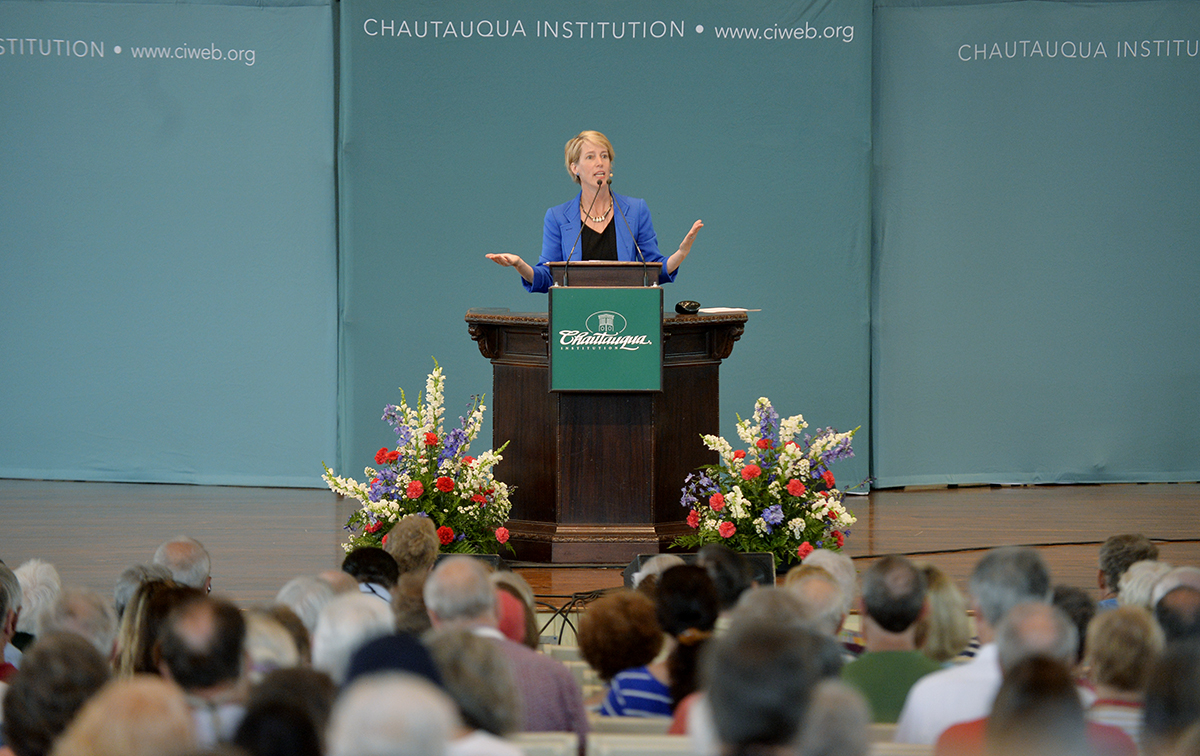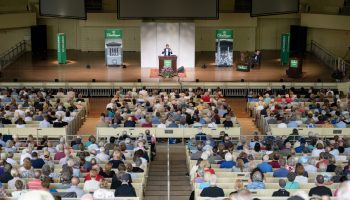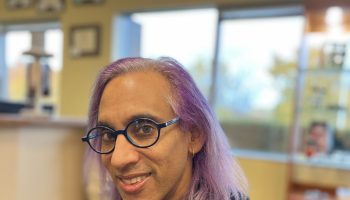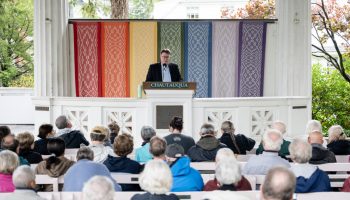Anti-corruption and transparency advocate Zephyr Teachout believes corruption lies at the heart of the political crisis America faces today.
Teachout, who is in the midst of a Congressional race in New York’s 19th district, discussed the history of corruption and the foundation it holds in democracy during the 10:45 a.m. Thursday morning lecture in the Amphitheater. She began with the establishment of the Constitution and the role corruption played in its crafting.
“They talked about this potential cancer [corruption] eating from the inside of the country that was, according to many of the [Founding Fathers], the most fundamental threat facing a country that wanted to be self-governing,” Teachout said.
During the Constitutional Convention, the framers thought of every possible form of corruption the country could face and tried to protect the nation against it, Teachout said.
“Corruption was when those in position of public power used that public power for private, narrow, selfish means instead of for the public good,” she said. “You could think of corruption as the opposite of patriotism or love of country.”
Benjamin Franklin said America would be lucky to last 200 years before the concept of corruption became an overwhelming internal threat to democracy.
Teachout said the word “corruption” can be seen countless times in James Madison’s notes of the Philadelphia convention.
“They understood that we’re all human,” Teachout said. “So you want to basically keep temptations at bay and build a system of free representatives.”
To do this, the founders created measures including the veto power; established how much weight the presidential veto would have over Congress; and determined the size of the House of Representatives and the Senate. They also sought to eliminate “place men.” Place men, at the time, were members of British Parliament beholden to the king.
Teachout said the country faces a unique case of place men in today’s society because more than half of congressmen become lobbyists after the end of their congressional term, which gives representatives the mindset of working in favor of their next potential careers.
That idea was something Teachout said the framers tried to prevent from the country’s origin. She told a story of Franklin, which inspired the title of her book, Corruption in America: From Benjamin Franklin’s Snuff Box to Citizens United.
As was European custom, Louis XVI of France offered Franklin a diamond-encrusted snuff box. The Founding Fathers believed that gift could corrupt Franklin when France was involved with future issues and decisions.
Despite the best efforts of the framers, Teachout said corruption still snaked its way into American culture. She listed some examples including the 1795 Yazoo Land scandal where every representative was corrupted by bribery and money but one.
“I sometimes think of democracy as this great, impossible game where you’re always fighting the most recent corruption threat,” Teachout said. “We had external threats, but the internal threats of corruption is one of the most fundamental, and we must always, always be vigilant against it.”
Teachout argued the country further sinks into a corrupted state as lawmakers continue to strike down laws intended to prevent corruption.
One example she used included the Buckley v. Valeo case in 1976, which introduced the concept that money spent on behalf of candidates or for a political party is protected by the first amendment.
That ruling also influenced the Supreme Court decision of Citizens United v. the Federal Election Commission in 2010, which ruled companies and corporations have the same protection as individuals.
Teachout also mentioned the convergence of business in the early 1980s, which forced many small businesses to close.
She called those two occurrences “cracks in the foundation” of the nation, which alone may not have been dramatic but affected the nation decades later.
“The financial crash happened,” Teachout said. “[Hurricane] Sandy happened. [Hurricane] Irene happened. The political system is not working, and they’re acting like everything’s the same — like they didn’t hear the forest fall down.”
Teachout said she personally has experienced the temptation of corruption during her congressional race for New York’s 19th congressional district. She recently found out her opponent spent half a million dollars in campaigning against her.
Although Teachout said it is in her human nature to want to pay attention to her opponent’s campaign, she knows it would be hurting her constituents because it is their needs she should be listening to.
Similarly, she said, Congress spends more time funding money for their own campaigns than listening to constituents. Teachout said the average congressman spends between 50 and 70 percent of their time fundraising.
“That is a beggar’s job,” Teachout said. “That is not the job of a free representative. Our elected representatives are supposed to listen to the issues about soil erosion, deal with the questions of how to build ground source heat pumps, encourage local manufacturing — that’s supposed to be their job.”
To Teachout, that is the corruption the framers worked to prevent. Campaigning and fundraising has enabled corruption through accepting big money from lobbyists and corporations.
Teachout said because of the current campaign system, lawmakers are more likely to pay attention to the needs of those who fund them, which makes them afraid to speak out against what these big donors desire.
“It’s not so much that they speak on behalf of the wealthy, it’s that that they don’t speak on behalf of everybody else,” Teachout said.
An audience member asked Teachout after the lecture what she would do to free herself from the pressure of fundraising.
She responded by saying she hoped to reach a large support system of 100,000 donors before entering office so she would not have to worry about fundraising, allowing her to spend more of her time in the field with her constituents.
“The real vision is to build enough of a donor base so that I can be free when in Congress to not do the phone banking,” Teachout said.
She continued to say although she has a solution for herself, it is not a solution that would work for the 500 different people in Congress.
“The only way we can do that is having publicly financed elections,” Teachout said. “I’ve got a lot of plans. I’ve got a particular plan to allow me to be free so I can whistleblow on the perfectly legal but corrupt Washington.”
In order to stop the corruption flooding the country, Teachout said two major changes need to happen: there needs to be public financing at every election level and Buckley v. Valeo and Citizens United v. the Federal Election Commission need to be overturned.
Teachout said those two changes would allow congressmen to interact with their constituents and focus on their needs rather than the needs of the donors who support them.
She described what the “matching model” of publicly financed elections is and how it would encourage lawmakers to spend more time with constituents.
The matching model would give a given candidate a match for every donation between $5 and $200 from a member of the candidate’s district. That match would be larger than the original sum, and Teachout used the example of the match being six times greater than the original donation.
She said if a district member were to give her a $10 donation, she would then receive a $60 from the government. She emphasized that matches should only be given when the donation comes from a member of the candidate’s district.
“Instead of most lawmakers being across the street with their lists of names [fundraising], they would be talking to constituents, looking at the flood damage, engaging in the issues because they would be free to listen,” Teachout said. “Right now, they are caged by our system.”
(Photo by Dave Munch.)






